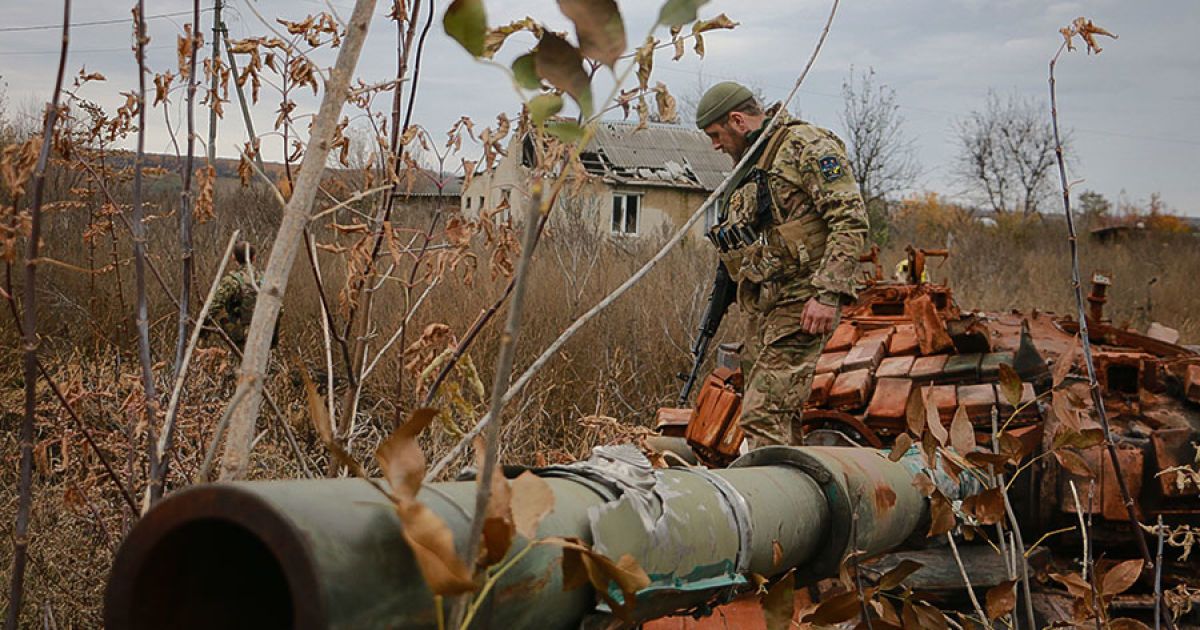The village of Tsupivka in the north of Kharkiv Oblast, like many other populated areas of the region, was under occupation from the beginning of the full-scale invasion.
The occupiers were knocked out from here in September during the counteroffensive of the Armed Forces.
The National Guard showed how the de-occupied village lives and what the locals tell about the crimes of the invaders.
Until February 24, about a thousand people lived in Tsupivka.
Today there are no more than a dozen.
Serhiy, a local resident, told how he managed to survive during the occupation.
The horrors of occupation and captivity
According to Serhii, he had to sit under the arrest of the Russians.
"We used to go to the toilet under escort, relieve ourselves with a bottle next to us, then take it out. Everyone lay on wooden pallets, threw a rag over them and slept there. Prisoners of war, up to the age of sixty, were forced to load ammunition, clean the territory and perform other household chores, sometimes they were woken up in the middle of the night," says a resident of Kharkiv Oblast.
In addition to the military, there were also civilians in captivity
"Civilians were brought in mainly if someone complained about someone. They pulled a sack or bag over their head, put their hands behind their back, wrapped them several times so they wouldn't run away and took them off only after they brought them to the premises," says Serhiy.
He says that the time spent in the "basement" seemed like an eternity to him, but he escaped torture.
"There was a situation when one young guy, who served in the Ukrainian army as a signalman, received a month's leave shortly before the war, and he came home here. When the occupation began, he was detained and taken prisoner. People came to Hoptivka to the canteen, brought food , the escorts did not pay attention, so he managed to deliver a note to his relatives, in the note he indicated that not only military personnel were captured, but also civilians," the deportee notes.
For this note, the occupiers began to murder all the prisoners.
"We were all woken up at night, and the occupiers have the psychology of the Soviet Union. I'm sleeping, they hit me on the head with a flashlight in my eyes, told me to get up, take out all my things, do squats. There were two large cells and one small one - single, in which a man was also sitting , they didn't let me talk to him. I wasn't alone there, my neighbor was with me, but they actually separated us all. There was no point in putting pressure on us, because they didn't have any evidence. However, when they let us out, then they warned us not to tell anyone anything, because there would be consequences. When the Russians were here, we were silent and even afraid to walk down the street, because leaving the house too much is too much trouble," the man recalls.
Resistance
Even during the occupation, civilian residents tried to resist the Russians, although there were collaborators who "reported" on the compatriots.
and hid the box with matches.
I don't know how much that helped.
Then he showed it to our guys," recalls Serhiy.
Locals stole ammunition for the Armed Forces from the enemy
According to the National Guard, there are dozens of such stories.
Some risked their lives to steal and hide Russian ammunition, some exchanged them for alcohol, others damaged the invaders' equipment.
After de-occupation, several improvised caches were found, in particular in the so-called "gray zone".
Dozens of boxes with 120 mm mines were found in one of them.
"People carefully put away those of them that, in their opinion, were supplied to the mobilized "LDNRivites" and were no longer suitable for firing. Their guesses were confirmed by our mortars and engineers, who made full use of the trophy ammunition," the message reads.
How does the village live now?
Serhiy has currently covered up the broken windows with film.
He prepares firewood, because this is the only way to keep warm.
Electricity wires are lying on the streets - they have not yet been restored.
The National Guardsmen assure that, as far as possible, they support the residents of the liberated territories.
De-occupation of Kharkiv region: terrible consequences of the stay of Russians
In almost all captured cities and villages on the territory of Ukraine, in particular in the Kharkiv region, the Russians
set up torture chambers for the torture and murder of
local citizens.
For example,
in the village of Pisky-Radkivski in Kharkiv Oblast, investigators found
a terrible torture chamber where prisoners were kept - local residents, anti-terrorist forces and prisoners from the Armed Forces.
The police know the details of servicemen who were abused by the Russians.
In the village of Kozacha Lopan, law enforcement officers discovered the bodies of two men with signs of torture and violent death (fractured bones of the skull, jaw and ribs).
Lydia Mykolaivna, the director of one of the schools in the Kharkiv region, was "in the basement" of the occupiers because she did not want to cooperate with the enemy.
A 60-year-old woman was beaten, abused and kept in terrible conditions.
Subscribe to our
Telegram
and
Viber
channels .
